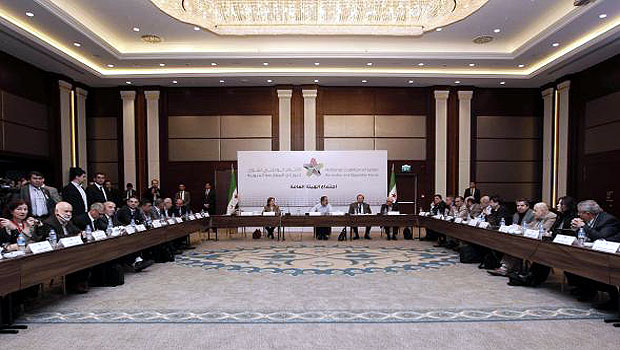
Syrian Opposition Coalition members and Syrian National Coalition members attend a meeting in Istanbul. (AP)
The meeting being held in Istanbul is the most serious attempt by the opposition to establish a rival administration and bring together all the factions working to topple the Assad government.
However, members of the opposition were quick to point out that a distinction needs to be made by the terms “interim government” and “transitional government.”
Speaking to Asharq Al-Awsat, Anas al-Abdu, head of the Justice and Construction Movement said that “the interim government means that the Syrian opposition separately forms the government, which aims at barring other options and the attempt to find a political settlement to resolve the crisis in Syria. As for the transitional government, it will be one of consensus between the opposition and the regime, and is supposed to be a part of the process of a political solution, which the Arab and UN envoy Lakhdar Brahimi is trying to reach.”
However, there are no guarantees of success. Two previous attempts to form an interim government failed because of divisions within the group, the Syrian National Coalition, and some members said before the meeting Monday that it was unclear whether they would agree this time. Many have also complained of insufficient international support for their initiative.
But many said that members feel a new sense of urgency, as the amount of territory under rebel control has expanded.
“What delayed this before was that there was no agreement on the importance of forming a government,” said Burhan Ghalioun, coalition member and former head of its predecessor, the Syrian National Council. “Now people are convinced that a government is necessary.”
But in a stance that could frustrate their Western supporters, including the United States, coalition members dismissed any possibility of negotiating with the current regime and insisted they will talk only when Assad has left power. Many believe the only way to accomplish this is through continued advances by rebel forces.
“There has to be a military victory on the ground to convince the regime or some elements in the regime” of the need for change, Ghalioun said. “The solution is not an end to the violence. This is linked to pushing the regime toward steps to a democratic system.”
Two years after the anti-Assad uprising began; the conflict has become a civil war, with hundreds of rebel group fighting Assad’s forces across Syria and millions of people pushed from their homes by the violence. The U.N. says more than 70,000 people have been killed.
